
From Jesus to Christ
Rudolf Steiner Press (Verlag)
978-1-85584-669-2 (ISBN)
Knowledge of the cosmic significance of Christ and his mission, once experienced intuitively, has faded over the centuries. As theologians and historians of the Church critically scrutinized the Gospel records, their focus shifted from a gnostic vision of Christ to the human figure of ‘the simple man’, Jesus of Nazareth.
In these enlightening lectures, Rudolf Steiner shows how ‘the Mystery of Golgotha’ (his term for the Crucifixion and Resurrection of Christ) can be understood as the pivotal event in human history, and the Gospels as ‘initiation documents’ that can serve to guide us on a path of spiritual development. He contrasts elements of the religious thinking of Jesuitism with Rosicrucianism – particularly in relation to the effect on human will – and discusses the characteristics of the two Jesus children in the contrasting accounts by Luke and Matthew. Steiner demonstrates how the great religious traditions of Zarathustra and Buddha helped prepare the way for the events of Palestine. In the process he clarifies controversial topics in Christian theology, such as the resurrection of the physical body of Jesus Christ.
The emphasis throughout these lectures is on rediscovering the esoteric path to Christ and awakening to a new revelation manifesting in our time: Christ as the ‘Lord of Karma’. This edition features a revised translation and is complemented with editorial notes and appendices by Frederick Amrine and an introduction by Robert McDermott.
Rudolf Steiner (1861-1925) called his spiritual philosophy “anthroposophy”, meaning “wisdom of the human being”. As a highly developed seer, he based his work on direct knowledge and perception of spiritual dimensions. He initiated a modern and universal “science of spirit”, accessible to anyone willing to exercise clear and unprejudiced thinking. From his spiritual investigations Steiner provided suggestions for the renewal of many activities, including education (both general and special), agriculture, medicine, economics, architecture, science, philosophy, religion and the arts. Today there are thousands of schools, clinics, farms and other organizations involved in practical work based on his principles. His many published works feature his research into the spiritual nature of the human being, the evolution of the world and humanity, and methods of personal development. Steiner wrote some 30 books and delivered over 6000 lectures across Europe. In 1924 he founded the General Anthroposophical Society, which today has branches throughout the world.
| Erscheinungsdatum | 12.11.2024 |
|---|---|
| Reihe/Serie | The Collected Works of Rudolf Steiner |
| Einführung | F. Amrine |
| Übersetzer | C. Davy |
| Verlagsort | East Sussex |
| Sprache | englisch |
| Maße | 155 x 235 mm |
| Themenwelt | Sachbuch/Ratgeber ► Gesundheit / Leben / Psychologie ► Esoterik / Spiritualität |
| Geisteswissenschaften ► Religion / Theologie ► Weitere Religionen | |
| Weitere Fachgebiete ► Anthroposophie | |
| ISBN-10 | 1-85584-669-1 / 1855846691 |
| ISBN-13 | 978-1-85584-669-2 / 9781855846692 |
| Zustand | Neuware |
| Haben Sie eine Frage zum Produkt? |
aus dem Bereich


